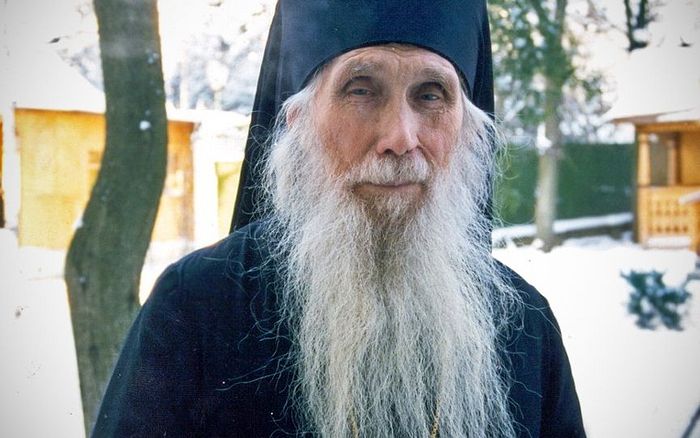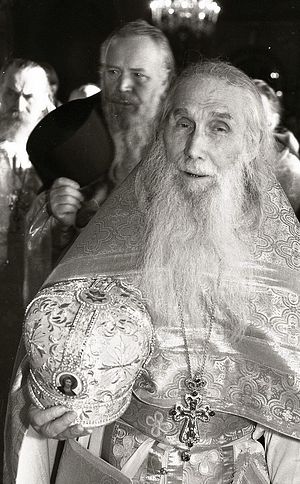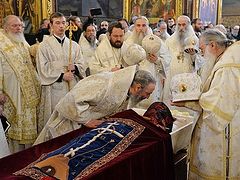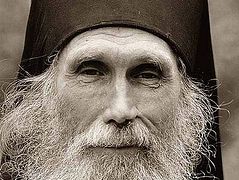On October 8, 2019, the Holy Trinity—St. Sergius Lavra celebrated the 100th anniversary of the birth of Archimandrite Kirill (Pavlov)—the spiritual father of its brethren and Orthodox Russia’s dearly beloved elder.
A number of books have come out for this significant anniversary, and the elder’s sermons have been republished.
Nun Evfimia (Aksamentova), before whose eyes twenty-five years of Archimandrite Kirill’s life passed, has shared her memories of the time spent near the elder at Peredelkino—the patriarchal residence near Moscow—which like the Lavra became the place of the elder’s ministry and ascetic labors.
 Archimandrite Kirill (Pavlov)
Archimandrite Kirill (Pavlov)
In about 1992, when Fr. Kirill had his pacemaker implanted, His Holiness Patriarch Alexei II invited him to visit Peredelkino more often—not just once a year just before Lent (as had been his custom), but depending on his general state of health.
And Fr. Kirill began to come and stay with us twice or three times a year, and afterwards he made his home at the residence and almost never left it…
Meanwhile, his life at Peredelkino was very similar to that in the Lavra in terms of his workload. Perhaps the only difference was that he didn’t have to get up at four in the morning and go to perform the daily communal prayer to St. Sergius with the brethren. Instead, in the morning hours the elder could open his favorite chapters of the Gospel, the Epistles, or the Lives of the Fathers quietly… He barely had any time for reading the Holy Fathers, though; so he would take the instructions of his beloved Abba Macarius and Abba Dorotheos whenever he went to rest in the Crimea.
All of us well remember the 1990s. Russian people went through so much grief and suffering. But at the same time many churches and monasteries were returned to the Russian Orthodox Church, and the life of the Church was being revived. And a huge influx of people flocking to Peredelkino began: bishops, clergy, monastics, seminarians, and laypeople… And not only did Fr. Kirill hear confessions, he also helped people in their material and everyday needs: he supported them financially, gave them food, provided the sick with contacts with doctors he knew, and asked wealthy acquaintances to help homeless victims of fires with repair and building work. It was a “social aid office” in the person of one man!
 I would often take Fr. Kirill from the “baptistery” in Peredelkino, where the sacrament of confession was performed in the early nineties, after two at night. After that we would have a combination of a late supper and an early breakfast in his cell together. The elder, though awfully tired, was in good spirits: “In the Lavra I hardly had a chance to listen to people attentively and ask them about the details of their life circumstances. And here I can find time and help them,” the elder would say. But the stuffiness in the “baptistery” which was chock-full of people and drafts caused recurrent pneumonia. After one of his pneumonia episodes the elder decided to receive visitors in his cell—right on the territory of the patriarchal residence.
I would often take Fr. Kirill from the “baptistery” in Peredelkino, where the sacrament of confession was performed in the early nineties, after two at night. After that we would have a combination of a late supper and an early breakfast in his cell together. The elder, though awfully tired, was in good spirits: “In the Lavra I hardly had a chance to listen to people attentively and ask them about the details of their life circumstances. And here I can find time and help them,” the elder would say. But the stuffiness in the “baptistery” which was chock-full of people and drafts caused recurrent pneumonia. After one of his pneumonia episodes the elder decided to receive visitors in his cell—right on the territory of the patriarchal residence.
We must give Patriarch Alexei II credit for his understanding. His Holiness lived in Peredelkino on a permanent basis, and the fact that dozens and even hundreds of visitors to the elder would walk past the patriarchal quarters just outside the windows every day could have justly annoyed the primate, whose workload exceeded all reasonable limits and he needed rest. But there was neither discontent nor annoyance; though Fr. Kirill would naturally ask us to regulate the inflow of visitors so as not to arouse discontent. His conscience would have never allowed him to ignore things that would disturb the general peace… But funny stories did occur as well. Once a group of nuns marched towards Elder Kirill through the front door of the quarters of the future Metropolitan Arseny (Yepifanov) of Istra, who was Fr. Kirill’s neighbor in the house. Afterwards the hierarch would often recall with a smile how he had suddenly discovered a pile of shoes that the tidy nuns had taken off and left in his corridor in order not to dirty the floor of Fr. Kirill’s corridor with their shoes.
From time to time His Holiness invited the elder to dine together. And we nuns who performed our obediences at the patriarchal residence, would observe Fr. Kirill behave simply, modestly, respectfully and at the same time with dignity at those dinners. And the Patriarch was always at ease with him.
 The Cathedral Church of holy Right-Believing Prince Igor of Chernigov in Peredelkino)
The Cathedral Church of holy Right-Believing Prince Igor of Chernigov in Peredelkino)
Fr. Kirill always remained himself: self-disciplined, the same, and well-disposed to everyone.
Sometimes Patriarch Alexei II was inclined to sing his favorite songs, such as “O Wondrous Island of Valaam”, and so on. The sisters were invited, sheets with the texts of the songs were handed out to everyone, the Patriarch would set the pitch, and we would start singing… And Fr. Kirill would join us, singing heartily and joyfully… Such things can never be forgotten…
On his way back to the cell after the communal meal, Fr. Kirill would stop and with a great interest and respect inquire of the gardeners and janitors about their work and health, greet the policeman on point duty and wish him a nice day, treating all of them to chocolates. Years later, when the elder became bedridden after a stroke, the policemen and janitors wept like children, saying: “No one has ever been kinder and more compassionate towards us than Fr. Kirill.”
However, I don’t think that all of us—nuns from various convents gathered at the patriarchal residence—were fully aware of the greatness of this man back then: Fr. Kirill behaved so simply and ordinarily. His simplicity ran counter to our stereotypes of elders as majestic heralds of the will of God who time and again edify and denounce everyone around them clairvoyantly... Fr. Kirill showed no signs of “grandeur” and greatness, to say nothing of any imperious edification.
He behaved among us, young and inexperienced novice nuns, as among equals and no more than that. And that was the best lesson for us to learn. For example, the elder always tried not only to show his appreciation of the dinner we had cooked by giving us sweets but also by helping us clear the table and wash up all the dishes. And he would do it with such joy and enthusiasm as if doing the washing-up were the most interesting thing in the world… Of course, we tried our best to hide at least half of the plates and cups from the elder because, as we knew, people were waiting for him by the door of his cell and his “working day” would last till late at night… But, nevertheless, his concern encouraged and supported us so much! After all, he cherished us like a loving mother… And one day he came out to us to help us unload bricks and got down to do this work energetically…
 Archimandrite Kirill (Pavlov) One day during our common meal, a sister who had just attended the solemn patriarchal service came into the refectory. Fr. Kirill greeted her joyfully and wondered: “Mother, you remembered us at the service, haven’t you?” The nun who was a little taken aback replied sincerely and with a simple heart: “Honestly, father, I didn’t even remember you!” Fr. Kirill burst out laughing and exclaimed, encouraging the sister: “Behold an Israelite indeed, in whom is no guile” (Jn. 1:47). With Fr. Kirill we were always at ease and joyful.
Archimandrite Kirill (Pavlov) One day during our common meal, a sister who had just attended the solemn patriarchal service came into the refectory. Fr. Kirill greeted her joyfully and wondered: “Mother, you remembered us at the service, haven’t you?” The nun who was a little taken aback replied sincerely and with a simple heart: “Honestly, father, I didn’t even remember you!” Fr. Kirill burst out laughing and exclaimed, encouraging the sister: “Behold an Israelite indeed, in whom is no guile” (Jn. 1:47). With Fr. Kirill we were always at ease and joyful.
With all his simplicity with us, Fr. Kirill was diplomatic with and courteous to our senior nun and never interfered in our sisterhood’s internal affairs, though he could have done this. He knew perfectly well how difficult it is to maintain good balanced relationships in any monastic community, all the more so because many of our nuns had their own father-confessors; and Fr. Kirill knew that, “when in Rome, do as the Romans”.
In truth any sister could anytime “run” to Fr. Kirill’s cell, “cry on his shoulder”, and complain about their lives and their “higher-ups”; after all, everyone is displeased with their bosses everywhere… The elder would always give them constructive and conciliating advice, each time calling them to settle any conflicts with humility and love… And through the jungle of our uncultivated egoism of neophytes we gradually began to appreciate the depth and beauty of obedience and self-denial…
Soon it became clear to us that a living example of a true monk (of whom we would read in the Lives of the Fathers, in the writings of Abba Dorotheos and St. John Cassian the Roman) was among us...
Today many call Fr. Kirill “a confessor to three patriarchs”, but the elder never thought of himself in such pompous terms. No one had ever heard him say: “I am the confessor of the patriarch.” One day the patriarchal residence was receiving an important guest from the Russian government, and, as was the custom, numerous guards surrounded the residence… At some point Fr. Agafodor drove up to the gate—on that day he took Fr. Kirill home after the service. They both were hungry and tired… The ignorant guards who knew little about the nuances of the residence’s internal life didn’t let them drive in. I think if Fr. Kirill had gotten out of the car, gone up to the guard and introduced himself, they would certainly have let him in (at the least being captivated by his human charm). But Fr. Kirill was too modest to disobey the common rules. Nobody was allowed—therefore, he was not allowed either. Then Fr. Agafodor drove off and stopped at a distance and together with the elder they modestly waited in the car, without complaining or causing a commotion… For long two hours, exhausted and hungry.
My personal memories of Fr. Kirill are full of such details that may seem insignificant. The routine of daily life. It is not particularly “attractive” or “sublime”… But it is an invariable attribute of the life of each human being, whether he is a Church hierarch, a worldly celebrity or a man in the street. Sometimes it is harder to cope with daily routine than to perform an exploit or a striking act.
 And Fr. Kirill was a rare kind of a person who had the ability to transform this everyday routine solely by his presence. And if, for example, you were weighed down by a dark cloud of hopelessness and despondency, Fr. Kirill was the one you just needed to look at and understand that indeed life is interesting regardless of the circumstances! He always walked in the presence of God. No one ever saw him angry or annoyed. He was never one person among people and another person in the solitude of his cell; rather, he was always peaceful, the same, joyful and affectionate to everyone.
And Fr. Kirill was a rare kind of a person who had the ability to transform this everyday routine solely by his presence. And if, for example, you were weighed down by a dark cloud of hopelessness and despondency, Fr. Kirill was the one you just needed to look at and understand that indeed life is interesting regardless of the circumstances! He always walked in the presence of God. No one ever saw him angry or annoyed. He was never one person among people and another person in the solitude of his cell; rather, he was always peaceful, the same, joyful and affectionate to everyone.
I recall how one day in winter Fr. Kirill went out for a short walk after a heavy snowfall. Meeting a grumpy janitor on the territory of the residence, he congratulated him warmly on the sun that had peeped out and the nice winter weather that had set in. But the janitor replied to the kind elder peevishly, “This weather’s nice to those who’ve nothing to do!”, hinting at his hard work of clearing the snow and that the cheerful strollers were mere idlers. But this rather unsophisticated roughness of a simple man amused the elder. “Oh, dear, dear worker!” he showed the janitor great consideration with words of support and literally loaded him with chocolates, thus melting and captivating his heart forever. And Fr. Kirill’s pockets were always full of sweets and chocolates.
Fr. Kirill hardly ever left the residence for visiting various monasteries and churches, where people would doubtless have been happy to have him. He didn’t consider such trips quite appropriate to someone who leads a monastic life. And he considered the honor which would have been given to him during his journeys around dioceses to be a sin against the ideals of modesty and humility. The elder deemed it more appropriate to open the Holy Fathers one more time in his cell. All the more so because he spent most of the time receiving people, answering phone calls from all over the world, and piles of letters always awaited his reply… He had neither energy nor good health for travelling… Sometimes my heart ached: I felt he needed a respite and a change of scenery because of his mortal fatigue. But his vacation would last exactly a month—not longer than that of any of the other Lavra brethren. And all that awaited him during vacations was incessant labors, and people’s requests and worries… And he was expected to display extreme compassion, complete devotion, and patience… Once late in the evening, after receiving people at Peredelkino for many hours, exhausted, Fr. Kirill asked me to read him the Book of Job aloud. The elder listened to all forty-two chapters up to the final verse very attentively… He didn’t complain about his sickness; he just gazed into the darkness through the window, sitting on the sofa. And next day we called an ambulance because he had had a heart attack.
Afterwards he would be repeatedly taken to hospital by ambulance with heart attacks after difficult working days.
But, nevertheless, Fr. Kirill was in good humor, rejoiced and loved this life, which many of us would have found too hard. More than that, Fr. Kirill gave thanks to God for the opportunity to do good to people and work tirelessly day and night this way. The first words he said when he ended up at the hospital after suffering that fateful, massive stroke were: “I won’t be able to serve people anymore…”
Fr. Kirill never sought fame or honor; nor was he ever disappointed when others were not very understanding and sympathetic to him (such things did occur as well)… I personally heard many people reproach the elder for leaving the Lavra for a “peaceful and comfortable life” under the Patriarch’s wing. “Every human being has his standards; we should show more magnanimity,” the elder used to say with a smile, when he had to face someone else’s callousness or narrow-mindedness.
And it is only now that I am starting to realize that for many years I had the privilege of seeing and knowing a man of great courage and great patience.
And the power of his greatness is not in beautiful and meaningful words (today many can speak in a beautiful and spectacular manner), but in the beauty of his everyday life; though few saw this beauty close up, I believe it is the only unfailing criterion of genuine Christianity.




